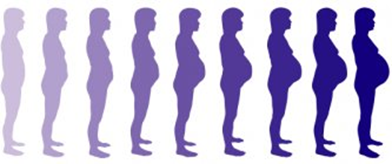Your pregnancy lasts for about 40 weeks commencing from the first day of your last menstrual period. These weeks are grouped into 3 trimesters. Let’s have a look at what happens to you and your baby during these 3 stages.
The first trimester, starting from week 1 to week 12, finds your body undergoing myriad changes. Hormonal changes, impact every organ system. The very first sign is your absence of periods. Other changes include extreme tiredness, tender swollen breasts, and bouts of morning sickness, craving or distaste for certain foods. Mood swings may prevail and some women suffer from bad headaches and constipation. Make tiny changes to your routine like retiring to bed early and eating frequent small meals.
 Over the second trimester, you will find your symptoms of nausea and fatigue starting to wane. Your belly expands as the baby grows. Most fascinatingly, by the end of this trimester, you will be able to feel your baby’s movements inside the womb. Aches and pains all over the body may be experienced and stretch marks begin to appear over the abdomen, breasts and thighs. Skin around the nipples darkens and patches of dark skin may appear on the face. Some women may experience numbness or tingling in the hands which can be symptoms of carpel tunnel syndrome. There might also be slight swelling on ankles, face and fingers. Slight itching on the abdomen, palms and soles of the feet may also be experienced.
Over the second trimester, you will find your symptoms of nausea and fatigue starting to wane. Your belly expands as the baby grows. Most fascinatingly, by the end of this trimester, you will be able to feel your baby’s movements inside the womb. Aches and pains all over the body may be experienced and stretch marks begin to appear over the abdomen, breasts and thighs. Skin around the nipples darkens and patches of dark skin may appear on the face. Some women may experience numbness or tingling in the hands which can be symptoms of carpel tunnel syndrome. There might also be slight swelling on ankles, face and fingers. Slight itching on the abdomen, palms and soles of the feet may also be experienced.
When you enter the third trimester of pregnancy, you are on the home stretch. The baby is getting bigger and you may notice that your trips to the toilet are more frequent. Further bodily changes may be noticed like shortness of breath, heart burn, swelling of ankles, fingers and face. If these are excessive, call your doctor immediately since they may be warning signs of preeclampsia.
A few pregnant women may have hemorrhoids. Breasts may feel tender with watery pre milk colostrums oozing from them. Some may even have trouble sleeping. As you approach your due date, the cervix becomes thinner and softer, which is normal and this helps the birth canal to open during the birthing process. Baby starts moving further down in the abdomen. Contractions will be felt with the onset of labour. Remain calm and composed as the final countdown starts. The more stress free and composed you are, easier will be the delivery.